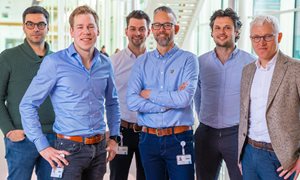
The European Commission grants 24 million euro from IHI for less invasive and better treatment of cancer using imaging and new technology. The Radboud university medical center, under the leadership of Roel Verhoeven, coordinates the work package on lung cancer. Together with an international research team, additional and new technology will be developed, enabling earlier detection, better detailing and improved treatment of lung cancer.
Is it possible take a biopsy of a lung tumor through the trachea, and treat a tumor locally in the same procedure? According to Technical Physician Roel Verhoeven and Radboudumc pulmonologist Erik van der Heijden, this will be reality soon. ‘The routine analysis of a biopsy at the Pathology Department currently takes about three days’, Verhoeven says. ‘But a laser microscope has been developed that can analyze a biopsy in 3D directly in the operating room. The microscope shows if the biopsy contains cancer and thereby enables immediate treatment.’
It is one of many innovations the researchers will work on thanks to a large grant within the European Commission's IHI program. The project IMAGIO has 30 partners and is led by Philips. In addition to lung cancer, the project also includes research into image-guided treatments for liver cancer and sarcoma. Radboudumc receives 3 million euros, which will allow researchers from different departments to join forces and expertise.
Google Maps
‘Early detection and treatment of lung cancer, preferably well before symptoms develop, greatly improves the chances to cure it’, says Verhoeven. ‘We therefore want to detect the disease earlier, better assess whether an abnormality is malignant, develop new treatment methods, image the disease more accurately and focus even more on the patient's quality of life. Most of the techniques are in fact already available. We will combine and further develop these techniques, and make them available to many more people.’
For example, the new laser microscope fits perfectly with a type of technology already implemented in Radboudumc: cone beam CT-guided navigation bronchoscopy. With this technique, a doctor inserts a flexible tube into the lungs through the patient's mouth, with a camera, light and mini-steerable instruments of about 2 millimeters at the end of the tube. During this procedure, the patient is scanned, and the doctor navigates the route to the suspicious spot using imaging aided by smart software, like a sort of Google Maps of the branches in the lungs.
Treating locally
‘Once we get to the tumor, we take a biopsy, which is analyzed immediately by this laser microscope’, says pulmonologist and professor of interventional lung diseases Van der Heijden, who developed the procedure for navigational bronchoscopy with his team. ‘We are working to improve the procedure through effective use of technology. The procedure becomes easier to perform by refining the mini-instruments and developing computer algorithms that more effectively guide the physician to the tumor.’ However, the procedure has also proven to be cost-effective in its current implementation and will therefore be reimbursed from 2024 onwards. For its broad implementation in the Netherlands, Van der Heijden already received a KWF grant of over half a million euros in December 2022.
If the suspicious spot does indeed turn out to be a tumor, what can the doctor do? ‘We can already treat a tumor locally with microwave energy, for example. Furthermore, within the IHI project, we investigate local administration of drugs that inhibit tumor growth, instead of systemic administration’, explains Verhoeven. ‘A radioactive label enables us to track where the drugs go and analyze the efficacy via a PET scanner.’ This type of new treatment combined with improved diagnostics will prevent more burdensome and invasive therapy at later stages of the disease, according to the researchers.
Who will participate?
Radboudumc's principal investigators for the lung cancer work package are: Roel Verhoeven and Erik van der Heijden (Pulmonary Diseases), Tim Govers, Colin Jacobs and Erik Aarntzen (Medical Imaging) and Francesco Ciompi (Pathology). The Radboudumc is collaborating with the University of Twente, the University in Tübingen, the Free University Amsterdam, ETH Zurich, Philips, Flash Pathology, Janssen Pharmaceutica, Pfizer, ImaginAb, Lung Cancer Netherlands and the European Cancer Patient Coalition.
For more information about the whole project, please click here.
IMAGIO is co-funded from the European Union’s Innovative Health Initiative under the Grant Agreement no. 101112053.
-
Want to know more about these subjects? Click on the buttons below for more news.
More information
Annemarie Eek

wetenschapsvoorlichter
Related news items

Putting the immune system on its feet
7 July 2025Immune cells gently kick their surroundings using hundreds of tiny feet. If they bump into something hard, it can have major consequences.
go to page


_1.png?width=500&height=300&ext=.png&type=BlockColumn1Zoom1)
